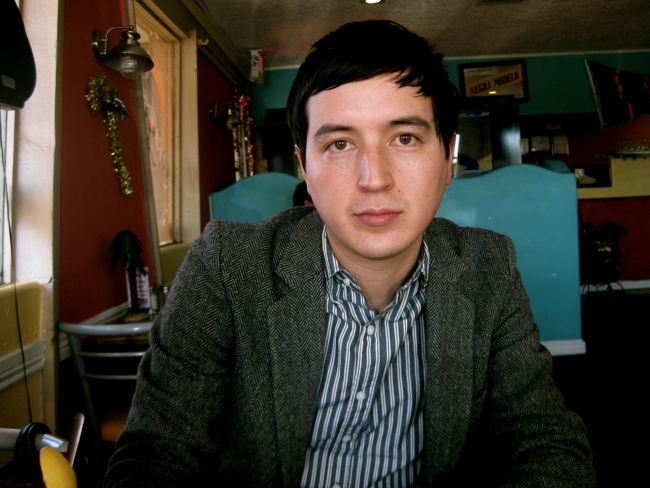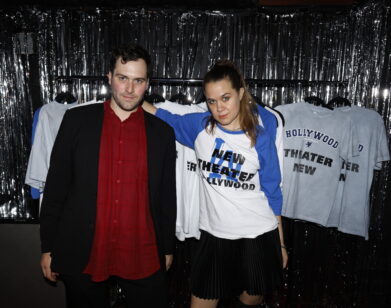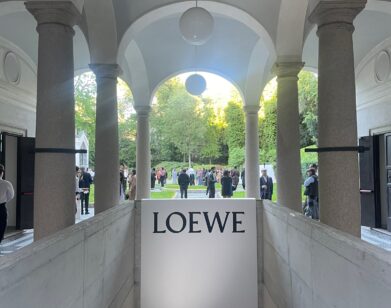Justin Go’s Heir Miles

ABOVE: JUSTIN GO
We all seek true love. Yet in Justin Go’s debut novel, The Steady Running of The Hour (Simon & Schuster), the search for love is tangled in the past and its mysteries. When Tristan, a young man living rather apathetically in San Francisco, receives a call from lawyers in London with a mysterious summons, his life shifts paths. He is tasked with proving he is the rightful heir to the huge fortune of Ashley Walsingham, a World War I soldier who died attempting to scale Mount Everest in 1924. Traveling the continent, Tristan begins to uncover relics of Ashley’s life, loves, and losses while discovering his own desires, dreams, and desperation for a quest. His journey is seamlessly interwoven with the love story of Ashley and the Imogen Seames-Andersson, the missing woman to whom he left his heart and fortune—unless Tristan can find out what happened to her. Go’s book poetic, epic, expansive, bloody with the battlefields of the war, and crisp and daunting with the peaks of Everest. Sweet and haunting, The Steady Running of The Hour captures the disconnection of our modern world as Tristan navigates the streets and bars of European cities and in the process perhaps meets a love of his own. We spoke with Go about modern love versus old-fashioned passion, the allure of fantasy, impossible tasks, near-death experiences, war, and what it takes to feel alive.
ROYAL YOUNG: I want to talk to you about fast-paced, fear-of-missing-out modern world love versus older, enduring love.
JUSTIN GO: In the book, the love the modern narrator experiences is meeting her in a bar and having incredible choice. Dealing with the fact that we can do whatever we want in life, which can be really terrifying. Versus the kind of love people had in 1916, where you met one person and didn’t even get much of a chance to get to know them before you went off to war. It was a powerful experience. It was like spending your life with your high-school girlfriend on the basis of talking in the cafeteria, because most of the soldiers were chaperoned when they spent time with their girls.
YOUNG: Do you think it’s easier to love someone the less you know about them?
GO: I think it’s easier to love someone in retrospect. It’s easier when you know just a little about them, or in your memory, because you forget all the other parts. It becomes something closer to this original romantic ideal.
YOUNG: Do you think distance plays into that, too? The more distance you have and the less you know someone, the easier it is to make them into whatever you want them to be.
GO: Yeah, distance adds to the appeal in some profound kind of way. It’s partly because they’re unreachable, but also there’s a certain pleasure in thinking about love. It’s different than having it. It’s like the pleasure of anticipation.
YOUNG: I agree with you, but I also feel like there’s a turning point where thinking about it isn’t enough.
GO: Right, in the end it’s completely unsatisfying it’s just a really intense experience. I’ve now been living with my girlfriend for two years and it’s normal life. To be able to interact with someone you love every day is amazing, but in some ways less absorbing than being broken-hearted.
YOUNG: I had a big long-distance relationship, and even though I don’t think it was ever going to work, the fantasy of it was so appealing. We were always on vacation.
GO: When you’re in a long-distance relationship, you project that person into all these places, and that is a really powerful experience. If she’s 3,000 miles away, you’re thinking about her on the subway, at dinner, at the bar. It’s kind of crazy, but it’s what’s so memorable. [laughs]
YOUNG: [laughs] Totally. What is the appeal of impossible tasks or feats?
GO: For me, that is really the heart of the book. I mean, there is no real reason to go mountain climbing. It is dangerous, difficult, and uncomfortable. To me, persistence in the face of impossibility is one of the most fascinating characteristics of human beings. We’re very romantic creatures, we pretend we aren’t going to die, we pretend we can control things. I mean we can control the structure of our planet and civilizations but we can’t control death or aging or suffering. The persistence of our culture and individual aspirations in the face of that is amazing. All success is sort of temporary.
YOUNG: Do you think everything is temporary?
GO: Well, yeah, in the scale of things. It’s a flash in the fucking pan, all of it. You can spook yourself by thinking that, but I don’t know that it matters. We’re here. I think, with 80 years of life, that people will risk their lives to feel alive is unreal.
YOUNG: What’s the thrill?
GO: It’s better to feel alive, even if it’s a fleeting moment like sticking a needle in your arm or climbing a mountain; for some people, that’s more exhilarating than having a secure, normal life. It’s clear we’re not really happy with just the fulfillment of our basic necessities.
YOUNG: I wonder if there was ever a time if that was enough. Maybe in cavemen times it was enough. [laughs]
GO: [laughs] Yeah, when you need to spend all your time acquiring your necessities, then you’re happy to get them. But when everything is provided for us, or we have to do some drudgery to put food on the table, then we’re in a weird position where we don’t know what it is that gives our lives meaning.
YOUNG: Where do you think our fascination with conquering nature and the world around us comes from?
GO: Everybody knows you can’t conquer nature, but it is an obsession of Western civilization to harness and control nature. Why not just understand it? I think the British are very obsessed with progress and cataloging and the height of Mount Everest and the kind of life forms on it. It’s all part of the idea that by understanding the world, man would march forward. Which I think became really quaint around the time of 1916 because of the war.
YOUNG: World War I and climbing Everest are both, in a way, impossible tasks. Yet your characters feel more alive pursuing them.
GO: Absolutely. You often hear with PTSD when people come back from war they feel like nothing matters anymore. With Everest the stakes are so high, which is what they have in common. In extreme situations, you are completely invested in being there in the moment. They climb the mountain as if it was war, but it is for fun, they want to.
YOUNG: It’s a way of finding a war without the war.
GO: Exactly and in a way writing this book was that for me. I think we all want to get the wisdom from extreme situations without being in them. It would be great if we could get all the knowledge of having a near death experience without ever having to be near death. If we could just appreciate our lives.
THE STEADY RUNNING OF THE HOUR IS OUT TODAY.






